Climate Point: Whale fieldwork, climate talks, EPA enforcement all on halt
Welcome to Climate Point, your weekly guide to climate, energy and environment news from across the Golden State and the country. From Palm Springs, Calif., I’m Mark Olalde.
In response to the ballooning coronavirus crisis, the U.S. Environmental Protection Agency announced it will halt a number of its enforcement duties, instead trusting polluters not to pollute. The agency argued the plan was necessary with so many workers remote. Observers questioned the motives. Here's USA Today's take on the decision.
And here's some other important reporting....
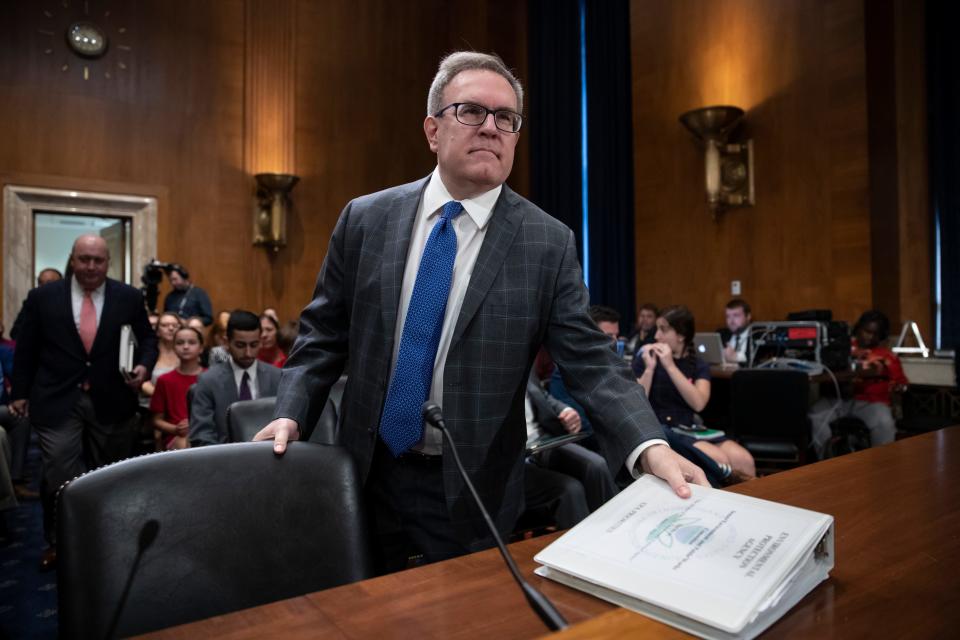
MUST-READ STORIES
Drowning in plastic. Frontline, NPR and the Investigative Reporting Workshop at American University premiered a new documentary this week digging into the plastics industry. Their findings will make you question the practice to which many well-meaning households religiously abide. The vast majority of plastic is never successfully recycled, yet the industry uses it as a false flag to create a guise of sustainability and keep its products on shelves, even if they really end up in oceans.
The rollback rolls on. As President Donald Trump continues to target regulations written during the Obama administration, the latest rules to meet the chopping block were fuel efficiency standards written in 2012. They initially called for 5% increases in gas mileage annually. Now, that's been dropped to 1.5%. The EPA said the new version of the rule will get new cars — meaning cleaner and safer cars — on the road. Environmentalists, public health organizations and consumer rights advocates point out flaws in the EPA's analyses and argue people will die as a result. I've got the details for you in The Desert Sun.
Gobbling up the coast. Our USA Today network partners at The Indianapolis Star report that Lake Michigan water levels are nearing a record high, eating up beaches and coastal infrastructure. Small towns are hurting and in search of funds to protect themselves and to rebuild.
POLITICAL CLIMATE
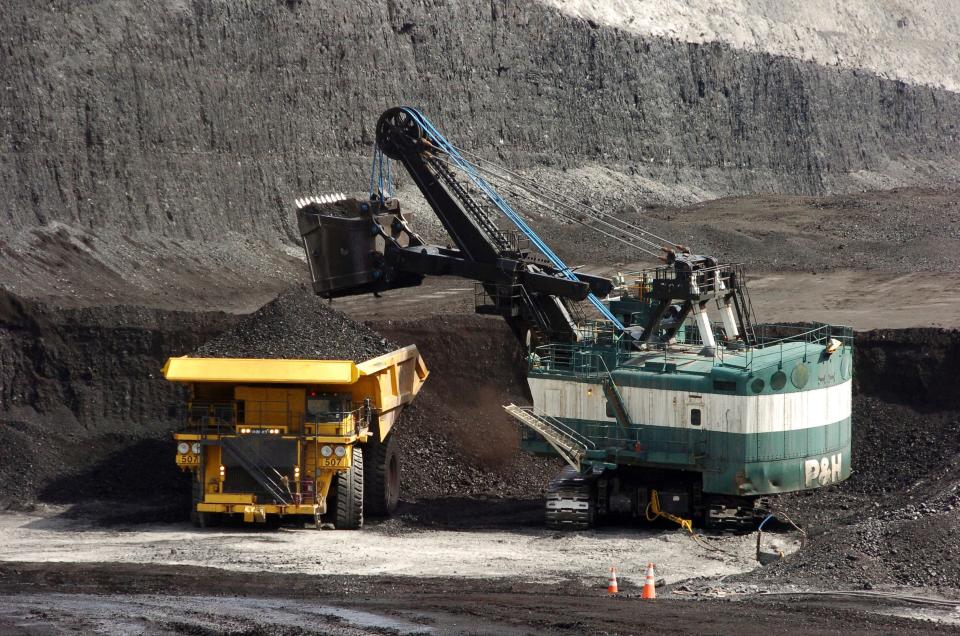
You get a tax break, you get a tax break. In the midst of the pandemic, fossil fuel industries are continuing to leverage subsidies from federal and state governments. S&P Global Market Intelligence reports that Gov. Jim Justice of West Virginia signed a law giving a tax break to certain coal plants if they continue generating electricity in the state. In Wyoming, according to the Casper Star-Tribune, Gov. Mark Gordon approved a bill that reduced the amount of money extractive companies must pay in taxes on oil and gas.
Be careful what you breathe. The coronavirus is said to have no concern for demographics, attacking everyone equally. But is that really true? The Center for Public Integrity recently published a story that examines the correlation between the illness and air pollution, finding that reduced air quality adds a dangerous risk factor to populations already susceptible to the virus.
Nonessential research. California researchers were just gearing up for another season of studying whales, the Los Angeles Times reports, when the pandemic hit full force. "The coronavirus outbreak, however, has largely upended that fieldwork — and that of incalculable other ecological studies nationwide," they wrote. As social distancing is enforced statewide, numerous research projects on threatened and endangered species have been placed on indefinite hold.
WHEN YOU HAND INTERIOR TO A LOBBYIST
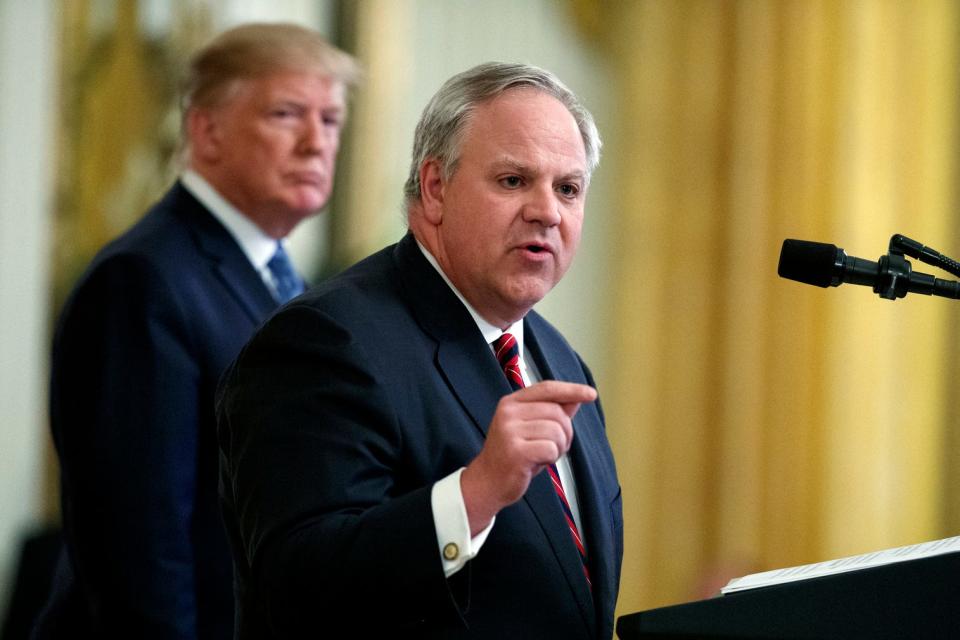
The deregulatory clock is ticking. David Bernhardt, who helms the powerful Department of the Interior, was until recently an oil, gas and agribusiness lobbyist. Environmental groups argue that background has influenced how he's guided the department. But, if agencies implement rules after May, they lose an extra layer of legal protection and are susceptible to being rolled back, depending on November's election results. A new piece in Outside examines whether Bernhardt and the department are using the pandemic as a "smokescreen" to push more deregulatory actions before that deadline.
Opening up Alaska. Bobby Magill of Bloomberg reports that the Bureau of Land Management is moving toward a potential approval of a 211-mile-long road that would cut through a national park to access mineral deposits. Proponents want to mine those precious metals to stimulate the local economy, while Magill wrote that the BLM's own analysis found it "could spread disease among Native Alaskans, fragment caribou migration corridors, and damage Arctic tundra." Trilogy Metals, the Vancouver-based company that stands to benefit the most, hired Bernhardt's former firm to push its proposal.
Fighting over the Grand Canyon. National Parks Traveler reports that the Department of the Interior initially refused to listen to the Grand Canyon National Park's acting superintendent and others who asked for the park to be closed to prevent the spread of coronavirus to its staff and visitors. It took until this Wednesday for the park to finally be locked down.
AND ANOTHER THING
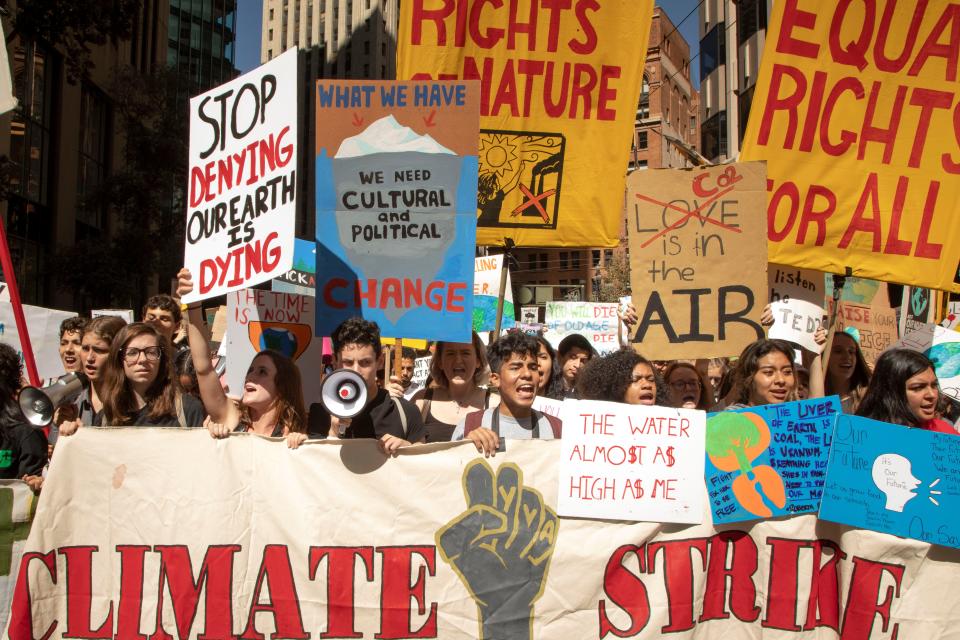
Paris Agreement hits roadblocks. The president of the 2020 international climate negotiations, known as COP26, broke the news on Wednesday that this year's meetings, scheduled for November in Glasgow, have been called off. Climate Home News reports that they will be pushed back to 2021, as the pandemic made the event's logistics impossible. As many as 30,000 delegates from around the globe were expected to attend, and the virus and the delay now are coupling to increase concern that countries might not update their emissions reduction plans.
Scientists agree that to maintain a livable planet, we need to reduce the atmospheric carbon dioxide concentration back to 350 ppm. We’re above that and rising dangerously. Here are the latest numbers:
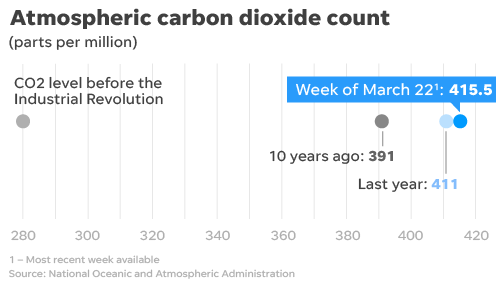
That’s all for now. Don’t forget to follow along on Twitter at @MarkOlalde. You can also reach me at molalde@gannett.com. You can sign up to get Climate Point in your inbox for free here. And, if you’d like to receive a daily round-up of California news (also for free!), you can sign up for USA Today’s new In California newsletter here. Cheers.
This article originally appeared on USA TODAY: Climate Point: Whale fieldwork, climate talks, EPA enforcement on halt

